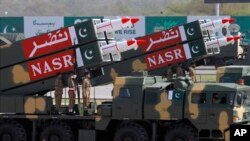Pakistan launched a short-range ballistic missile Thursday, formally equipping the military with a nuclear-capable rocket that officials say would deter a surprise conventional attack against the country by rival India.
“This training exercise involved launching of quad salvo for desired effects. NASR is a high precision, shoot and scoot weapon system with the ability of in-flight maneuverability,” the military announced in a statement.
Experts explained the weapon system’s ability to launch several missiles at once would allow Pakistan’s military to hit many targets at the same time.
Islamabad recently enhanced the NASR missile’s “flight maneuverability” and extended its range to 70 kilometers (43 miles) from 60 (37 miles).
U.S. concerned
The development of Pakistani tactical battlefield nuclear weapons has been a source of concern to the United States because their smaller size and quick deployment increases the risk of a nuclear conflict with India, say nonproliferation experts.
The Pakistani military noted in its statement the weapon system has augmented “credible deterrence” against “prevailing and evolving threat spectrum, more effectively including enemy’s ballistic missile defense and other air defense systems.”
Pakistani officials say that the nation’s short-range battlefield NASR missile would deter the bigger neighbor India from imposing a sudden, limited assault with its massive conventional military force under New Delhi’s so-called “Cold Start” doctrine.
India buys Russian air defense system
India’s decision to buy the Russian-made S-400 Triumph air defense system, has also raised alarms in Pakistan, where officials have warned the deal will “further destabilize strategic stability” and lead to a “renewed” arms race in South Asia.
Increasing and diversifying the nuclear arsenal is not seen in Pakistan as a policy choice, but rather a compulsion to maintain an effective deterrence vis-à-vis India, noted researchers at Washington’s Carnegie Endowment for International Peace in a recent article.
“Any advances in India’s conventional military capability, nuclear arsenal, or strategic position amplify the perception of an incessant and unremitting threat for which Pakistan has no recourse other than nuclear weapons,” observed the article, published in earlier this week in Washington Quarterly.
Pakistan and India have fought three wars since gaining independence from Britain in 1947. The two countries have since equipped their armies with nuclear weapons, raising fears that another conventional conflict could escalate into a nuclear exchange.
The territorial dispute over Kashmir, which has sparked two wars, continues to strain bilateral ties and prevents India and Pakistan from resuming long-stalled political talks. Intermittent military clashes across the de facto Kashmir border also have become routine, causing dozens of casualties on both sides.




